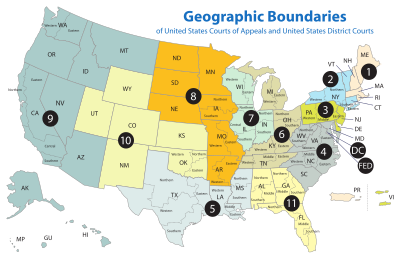Establishment and Structure of United States District Courts
- District courts established by Congress under Article III of the Constitution
- No constitutional requirement for district courts to exist
- Opponents argued for a limited federal judiciary with only the Supreme Court
- Edward Carrington and Alexander Hamilton discussed this viewpoint
- First Congress created the district court system
- 89 districts in the 50 states, including territories
- At least one judicial district for each state, District of Columbia, and Puerto Rico
- States have one to four districts
- States with two districts named geographically (Northern-Southern or Western-Eastern)
- Most states with three districts add a Middle District, except Illinois and Oklahoma
Other Federal Trial Courts
- United States Court of International Trade handles international trade and customs cases
- United States Court of Federal Claims has exclusive jurisdiction over money damages against the United States
- United States Tax Court has jurisdiction over contested pre-assessment determinations of taxes
- District court has concurrent jurisdiction over many cases heard by other federal trial courts
- District court is the only one with jurisdiction over civilian criminal cases
Judges and Their Appointment
- District judges officially titled United States District Judges
- Other federal judges can also sit in a district court upon assignment
- Number of judges in each district court set by Congress
- Federal judges appointed by the president for terms of good behavior
- Senatorial courtesy allows senators to have input into the nominating process
Powers and Responsibilities of District Courts
- District courts are courts of law, equity, and admiralty
- Can hear both civil and criminal cases
- Federal district courts have limited jurisdiction
- Can only hear cases involving disputes between residents of different states, federal law questions, or federal crimes
- State courts retain concurrent jurisdiction in most federal matters
Clerks and Attorneys
- Responsible for overseeing filings, maintaining records, processing fees, and managing non-judicial work of the court
- Appointed by district courts and may have deputies, clerical assistants, and employees
- Must reside in the district, with exceptions for certain districts
- Judiciary Act of 1789 authorised the appointment of clerks to assist with federal judicial business
- Duties prescribed by statute, court customs, and policies established by the Judicial Conference
- Attorneys must be admitted to the bar of the specific district court to represent a party in a case
- No separate bar examination for federal practice, except for patent practice
- Admission generally available to attorneys admitted to practice law in the state where the district court sits
- Some districts extend admission to attorneys admitted in other states, with conditions varying
- Application, fee, and oath of admission usually required, with additional requirements in some districts
The United States district courts are the trial courts of the U.S. federal judiciary. There is one district court for each federal judicial district, which each cover one U.S. state or, in some cases, a portion of a state. Each district court has at least one courthouse, and many districts have more than one. District courts' decisions are appealed to the U.S. court of appeals for the circuit in which they reside, except for certain specialised cases that are appealed to the U.S. Court of Appeals for the Federal Circuit or directly to the U.S. Supreme Court.

District courts are courts of law, equity, and admiralty, and can hear both civil and criminal cases. But unlike U.S. state courts, federal district courts are courts of limited jurisdiction, and can only hear cases that involve disputes between residents of different states, questions of federal law, or federal crimes.